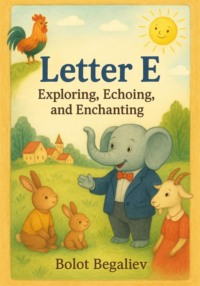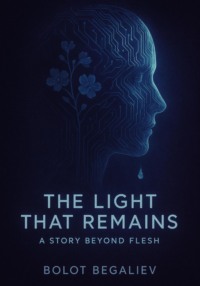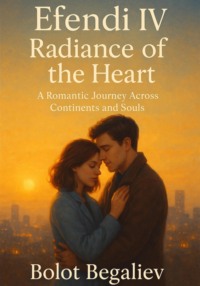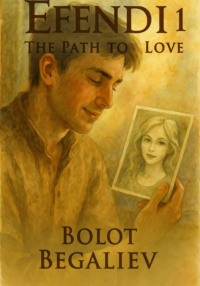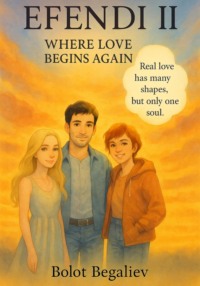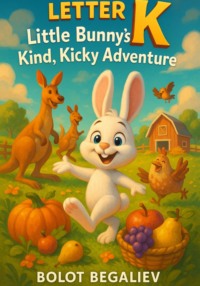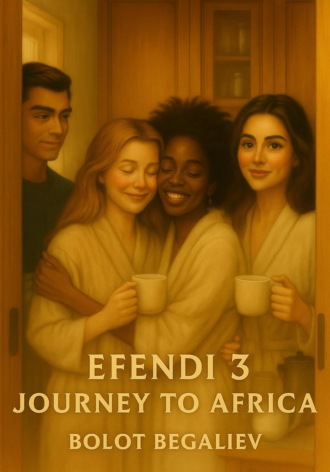
Полная версия
Efendi 3. Journey to Africa

Bolot Begaliev
Efendi 3. Journey to Africa

Chapter 1: Journey to Africa
(or: “Where the Sky Burns Above the Savannah”)
Cindy had always been an unusual woman. She had no fear of the unfamiliar, no envy, no desire to possess. She loved the way only few do – deeply, freely, with trust. “Let’s go to Africa,” she said one evening, unrolling a map across the wooden table. “Through the south. Through dust and stars. I want you to see real land.” And, so they arrived there – where roads are not asphalt, but red clay. Where the air carries the scent of roasted corn, and the sky shimmers with heat and song. Where the wind smells of smoke and honey. They traveled through the savannah, listened to drums in distant villages, slept in a tent beneath the hum of night insects. Children laughed without fear. The elders smiled toothlessly. And the women sang – even when they weren’t cooking or working. Life itself was a song – and for that alone, it deserved to be sung. They stopped in a village where tourists weren’t treated as spectators – but as kin. Fruits were brought to them in open palms. They were shown how to weave bracelets from palm threads. And in the evenings, the stars hung so low it seemed you could reach out and touch them. One such evening, when the sky had turned a deep violet, and fireflies lit up the grass like the breath of the planet, a girl approached them.
Her name was Ayla. She had dark, deep eyes – the kind of eyes you only see in those who look at the world from within.
She came up to Cindy, lowered her gaze, and stood in silence. Then – quietly, almost in a whisper: “I don’t want to marry the man they chose for me. He’s old. He drinks. He hits. But I saw you. You are kind. If your husband… takes me as his wife – I will be saved. Say nothing – and I’ll leave. Say yes – and I’ll become your sister. Loyal. Grateful.” Cindy didn’t answer right away.
She looked at her for a long time. Then – at the sunset, at the fire, at the sleeping child beside her.
Something ancient stirred inside her. Not reason – something feminine. A feeling. Intuition.
Ayla wasn’t an accident. She was a calling. Later, in the quiet of the tent, Cindy leaned into Efendi.
His chest was warm and steady. His shoulder – solid as stone. She listened to him breathe.
Then – in a whisper, but firmly: “You’re kind. And you’re strong. Save her. Maybe she’ll become your sister. Maybe your wife. But before anything else… give her a chance. A chance for freedom. For life. For light. Do what you feel is right. But don’t walk past if you can be her shore.”
That night, they didn’t sleep. Outside, the drums still played. But inside – a different music played.
The music of choice. Of compassion. The music of real love – the kind that doesn’t ask, but gives.
The Bidding for a Life
The morning was still sleepy, with mist draped over the hills like a light blanket. A fire crackled at the center of the circle. The air was filled with smoke, spices, and that particular tension that precedes a decision that will change someone’s life.
Ayla sat a little apart. A cup of herbal brew in her hands. Silence in her eyes. Three suitors had already arrived.
The first – broad, arrogant, with a heavy gold ring and heavier gaze. The second – older, his face as dry as his jokes. The third – wealthy, but rumors whispered he beat his servants. And women. They spoke loudly, smiled falsely, threw around numbers and bragged about their herds.
Efendi said nothing. He sat by the fire, back straight.
Cindy beside him – holding his hand. Her gaze soft, but steady. Like clay used to shape destinies.
One of the elders said: “Well then. Since all are here, let’s begin.
Whoever offers the most – will have the final word.” The bidding began. 120 Cows and a Promise from the Heart At dawn, the whole village gathered at the foot of the hills. Elders in white skullcaps. Children perched on fences. Women in bright scarves. Everyone knew: today, the fate of a girl named Ayla would be decided.
The first suitor, son of a wealthy cattleman, stood and declared proudly: “Fifty cows. And a mare on top.” The crowd buzzed: generous. The second – a merchant from the south – smirked and raised the stakes: “Fifty cows, ten gold rings, and a handmade carpet.”
Ayla stood with her eyes lowered. As if her body was there – but her soul was far away. She knew: whoever offered more would take her. But none of them knew how she cried at night. None knew her poems written in charcoal on clay. None had spoken to her like she was alive.
Efendi rose calmly. Stepped closer to the circle. His voice wasn’t loud – but it rang with steel. “One hundred and twenty cows. The best.” Silence fell. Even the wind stopped rustling the leaves.
The elders exchanged glances. One murmured: “For such a price, only khans have taken brides.”
But Efendi wasn’t finished. He looked at Ayla – directly, gently. And continued: “I also offer her a gift – her mahr. Not gold. Not horses.
A home. A home in Europe. A garden where she’ll walk barefoot. A window that opens to the sea. Her name – on the door. There won’t be ‘first,’ ‘second,’ or ‘third.’ There will be ‘Ayla.’
A wife. An equal. A woman whose voice will be heard without interruption.” Ayla lifted her head.
Her eyes sparkled. But it wasn’t sorrow.
It was the quiet of someone finally being seen – not as a possession, but as a soul.
An elder stood. Raised his staff. “The word is spoken. Ayla becomes the wife of Efendi. The bidding is over.” And then – in complete silence – she walked to him. Step by step. No bow. No trembling.
She stood beside him, and took his hand. And in that moment – neither Efendi, nor Cindy, nor the whole world – stood between them. Because in their hearts, only one thing remained: Freedom. Respect. And a love that begins with the right to simply be.
In Ayla’s Heart (Continuation) Ayla didn’t come to him as a captive – but as destiny. She walked slowly, but with every step, her strength seemed to grow. She stood before Efendi and said quietly: “You gave me not just a name… you gave me back my face. Where others called me a thing, you called me a person.
I won’t just be your wife. I’ll be your shadow, if you ever need quiet. I’ll be your song, if you ever need light. I’ll be your world… if you let me.”
Efendi looked at her for a long moment. And said: “You already are. And even if the world never knows how it happened…
I will remember.” And he took her hand – not in ownership, but in respect. With that touch, a new chapter began. And in it, there was no fear. Ayla and the Song of Freedom The house received Ayla the way the earth welcomes rain. Cautiously, at first. Then – with quiet joy. Jenny brought her a shawl.
Cindy – a bracelet.
Efendi – time.
In the evenings, Ayla would sing. Not loudly. Not to be heard. She sat by the window, where the curtain swayed in the evening breeze, and sang with a voice like the breath of the earth after rain —deep, warm, restrained, but full of peace. “You sing like an artist,” Efendi said once. “Not for the stage – for the soul.” Ayla smiled. There was no pride in her smile – only memory. “There was one like that in our tribe,” she said. “They called her The Dancing Bird. She didn’t just sing – she stirred women to rise.
When I was little, my mother called me by her name. She used to say, ‘You’ll become like her… if you learn to sing and forgive.’” Efendi nodded quietly. Then walked over and sat beside her. “Then from now on,” he said gently, “you are Ayla the Dancing One. A free star.”
She didn’t answer right away. She simply closed her eyes – and kept singing. And in her song, there were:
– barefoot steps across hot earth,
– the tears of a girl who wasn’t allowed to speak,
– and the fire of a woman who was finally heard.
Romance Under the African Sky Night settled over the savannah like a soft, worn blanket. The fire crackled, scattering sparks into the velvet dark. There were no walls. No fences. Only stars, warm dust, and the quiet breathing of the earth. They were alone. Ayla approached – not as a guest, not as a wife. As a woman whose fear no longer trembled inside her. Step by step. Slowly. Steadily. She stopped beside him. Without a word, she placed her palm on his chest —where his heart beat strong and sure.
Her fingers were warm, like the fire itself. “I don’t know the words of your language,” she whispered, her lips barely moving. “But I understand your heart already.” Efendi said nothing. He simply took her hand —and kissed its center, the place where children draw the sun.
Then he wrapped her shoulders in a blanket and gently pulled her close. Ayla rested her head on his shoulder. He placed his hand softly on her hair.
They sat in silence. Only their breathing remained —rising and falling in unison, like music without melody. It wasn’t passion, like in books. No vows. No fireworks. It was closeness. Quiet – like the warmth of a fire. Alive – like a night where you’re not afraid. Real – because it needed no words.
The Road to the Heart of Africa
The morning didn’t begin with an alarm clock, but with the whisper of wind through tall grass.
The jeep swayed gently over bumps in the road —like a boat sailing through the sea of time.
Inside – silence, the kind you hear in a museum before it opens. Everyone was still half-asleep, eyes barely open to the rising sun. Cindy held a thermos of coffee, Ayla stared out the window, as if trying to memorize every bend in the horizon. Efendi simply breathed – deeply, calmly —like a man who knows he’s not heading toward an answer, but a revelation.
Joseph, their guide, cheerful like a morning radio host, glanced at them in the mirror.
“Welcome to my universe,” he said.
“Where zebras respect the road – and lions only if they feel like it!”
Ayla smiled for the first time that morning – quietly, with just the corner of her lips.
Cindy laughed – softly, like wind in the grass. “And what about hippos?” she asked. “Do they respect anything?”
“Oh no, madam,” Joseph shook his head.
“Hippos are like politicians. Everyone knows they’re dangerous,
but no one says it out loud.”
Laughter rose and fell, light as a passing wave.
The road ran between acacia trees, their branches reaching upward like the hands of old men.
Birds lifted from the grass like thoughts startled from being forgotten.
Ayla looked at it all like someone in a dream she’d finally woken up inside.
Now and then her hand would find Efendi’s – and wouldn’t let go. He said nothing. Just squeezed her fingers.
He knew: the silence beside the woman you love is the loudest music. Cindy pulled out her camera from her backpack. “I want to keep all of this,” she whispered. “Even what won’t fit in the frame.”
Soon, the jeep stopped near a hill.
“Break time,” said Joseph.
“Elephants often come here. I can’t promise… but if we’re lucky – you’ll see giants.”
They stepped out. The air was warm – like a mother’s palm. From the hilltop, a vast panorama spread out: grass stretching to the horizon, lone trees, and in the distance – a shimmer of water.
Ayla walked to the edge and closed her eyes. Cindy removed a simple pendant from her neck – a small blue stone —and placed it around Ayla’s.
“I wore this when I was waiting for my first daughter,” she said.
“Let it remind you: you’re not alone.”
Ayla pressed it to her chest in silence.
Efendi watched them.
And thought: Some people make life brighter.
And some – make it quieter.
More real. More alive.
Not louder. But with breath.
Just then, the silhouettes appeared below.
Elephants.
Slow, like time itself. Majestic, like history.
Ayla gasped.
Cindy snapped a photo.
Efendi just watched —not through a lens, not through a screen —
but directly, into the eyes of the real. On both sides of the dusty road, the savannah stretched wide.
The horizon was like the earth’s breath – calm, warm, glowing. Scattered acacia trees stood like painted symbols, their branches shaped like open palms – peaceful, wise.
Zebras crossed the fields like black-and-white melodies, weaving into the rhythm of motion.
Further on – a herd of wildebeests, slow and solemn, with curved horns that looked carved from myth. In the cab, there was silence. Even Joseph fell quiet for a moment. Then he spoke, softly:
“These aren’t just antelopes.
They’re survival artists.
They chase the rain.
Their horns are like arrows from ancient gods.
If you see the gnu… a hunter is near.”
And as if to echo his words —
from the tall grass, like the earth exhaling,
rose the golden head of a lion.
Heavy, radiant, with sun-filled eyes.
“The king,” Joseph whispered.
Then smiled. “But don’t worry. He’s full. And a full lion is like your grandmother after a big stew —
He just stares at nothing and thinks, ‘I need a nap, not trouble.’” Laughter filled the jeep – quiet, reverent. Only those who truly respect the king can joke about him. Later, they stopped under the wide shadow of a baobab tree.
It stood like a sentinel of centuries – thick, ancient, its bark cracked like sunbaked clay. Joseph stepped out first, squinted toward the distance.
“Over there,” he pointed,
“live the Maasai. Proud people. Tall, graceful. Eyes like coals.
When a boy turns fourteen, he becomes a warrior.
Once – with a spear against a lion.
Now – with legend inside. But the soul remains the same.”
He paused. Let the thought sink in.
“The women wear necklaces down to their waists.
Each color tells the story of their family.
And every tribe has its own tree – Beneath it, children are born. And beneath it – silence falls when an elder leaves.”
Cindy leaned in and asked, almost in a whisper:
“What if a child is born during the rain?”
“Then,” said Joseph,
“they’ll bring green to the family. And laughter. And strength.
Because water – here – is sacred.”
“And if during a drought?”
He didn’t answer right away.
He looked to the sky. Then at Ayla, sitting quietly nearby. “Then the family learns to become a spring for others. And that too – is a blessing. Because someone without water, but with heart —can quench the thirst of the world.” They drove through dust, as if through myth. Along the horizon moved giraffes —tall, graceful, like dreams drifting toward the sky. The silence of their steps was almost holy.
“Giraffes,” Joseph said softly, “have the gentlest hearts.
They never hurry – because the kind have no enemies. Only their path.”
Ayla listened closely. Cindy closed her eyes, letting the rhythm of his voice flow through her. Efendi – just looked out the window. He loved to listen without interrupting. Sometimes silence spoke for him.
“And hippos,” Joseph continued, “they smile like plush toys… until they fall in love.
If a female chooses one, she’ll wait for him. But if a male falls in love – he’ll chase off his rival all the way to Congo. Without a second thought.” Cindy chuckled. Ayla laughed too – this time, freely.
Joseph smiled at the corner of his mouth. “And the elephant…” he added. “The elephant is like memory itself. He never forgets. If you give him water – he’ll recognize you ten years later. If you harm him – he’ll remember forever. Like a mother-in-law. Only bigger.”
They all burst into laughter. The camp shook with it. The jeep trembled with the footsteps of the savannah. But Efendi didn’t laugh. He smiled quietly, gazing at the landscape. To him, each animal was like a person.
With its own soul. Its own memory. Night by the Fire – Stories Like Roots When the sun melted into the dust, they returned to camp – small but warm. The fire was already lit. Smoke curled into the sky, like a message to the ancestors. Everyone sat in a circle. The night smelled of fried bananas, coal, and spiced tea. Joseph began to speak —slowly, as if he were a baobab tree himself, and his words – the rustling leaves of memory.
“They say there was once a lion who didn’t eat the antelope. Because in her eyes, he saw his mother. So he turned away. Lay beneath a tree… and slept.”
A pause.
“And there’s the story of a girl, bought for one hundred cows. And three songs. Because songs matter more. Cows feed the body. Songs feed the soul.” Cindy squeezed Efendi’s hand. Ayla stared into the fire – its flame reflected in her eyes.
She didn’t speak. But her silence held more than any story. Late at night, the wind shifted.
The jungle sounds grew thicker —hyenas growled, baboons chattered. The sky leaned closer.
The stars felt like they had come to sit beside the people. Ayla went to sleep first.
Cindy curled up in a blanket, dozing against Efendi’s shoulder. And he stayed there. Listening to the crackle of embers. Watching shadows move across the savannah. Breathing with the land.
“Do you accept me?” he whispered into the dark. And as if in answer —an owl flew silently overhead. Like a blessing.
The Road of Fire
The savannah was still asleep. The sky – deep and dark grey, like silk before dawn. Only in the east – a faint stripe of gold. The air hung dry and tight, like the moment before a storm. The old SUV idled softly. Ayla sat in the back seat, wrapped in a travel cloak shoulders hunched, fingers interlocked. Beside her – Efendi. Silent. Watchful. Up front – Joseph, their guide, gripping the wheel like a rope in a storm.
Suddenly—
“They’re coming,” Joseph said, low and grim. “The suitors. With guards. Seems they didn’t accept your price…”
Ayla lowered her head, as if she’d known this all along. “I felt it. Men like that don’t let go. Even if they lose.” “You’re not a commodity,” Efendi answered, his eyes fixed on the mirror. “And I’m not a seller. We’ll reach the airstrip. We just… don’t stop.” The engine roared. Behind them – a rising cloud of dust.
On the horizon – shadows of vehicles. Hunters. The first gunshot hit the air like a crack of thunder.
The second – struck the rear door. Metal screamed. Ayla recoiled, clutching her chest.
“Down!” Efendi barked.
He veered off the road – the wheels bounced over stones,
the jeep shrieked. Dust swallowed the windshield.
Ayla was trembling.
But she didn’t cry.
She looked out the window – like staring into a mirror of fate.
And for the first time in a long time – she didn’t look away.
“Do you have a gun?” Joseph asked.
Efendi pulled out an old Browning, its grip worn smooth.
“A gift from my grandfather,” he said.
“I never missed while hunting.
Now… we’re the hunted.”
Another bullet shattered the side mirror. Shards rained into the cabin like hail. Efendi leaned halfway out the window, aimed, fired. One. Two. Three. One of the cars behind swerved into the bushes. A scream. Some slowed – but not all. “A path! To the right!” Ayla shouted. “Past the acacia!”
Joseph turned sharply, skillfully steering onto a narrow, stony trail winding between baobabs and dry thorn bushes.
The savannah didn’t care. It only hummed – with insects, with wind, with the memory of ancestors. But beneath that hum, something whispered: Choose your fate – or it will choose you. Ahead – a gate. The airstrip.
A single hangar. An old helicopter ready for takeoff. The pilot stood on the steps, waving. “Almost there,” Joseph breathed. Behind them – the last shots. But they were already late. Too late.
The jeep stopped. Tires hissed against sand. Ayla threw open the door and ran. Efendi grabbed her hand.
They sprinted toward the helicopter —wind, dust, morning – all blending into a run that felt like prayer.
When the helicopter lifted off the ground, Ayla closed her eyes —and for the first time in a long, long while… she smiled.
Cindy sat beside her, wrapped her arms around her, and whispered:
“Now you’re part of us. And we… are part of you.”
And far below, where the dusty road remained, silence returned to its place. Because the pain stayed with the earth.
And women who are loved —they fly higher.
Airfield. The Sky’s Threshold
On the horizon – a strip of concrete, scorched by the sun.
Flat, as if the earth itself had turned into a wing.
At the edge – a small plane, white with a blue stripe, ready for takeoff.
The pilot – a dark-skinned man from South Africa – is already checking the instruments.
The engine hums like a heart before a leap.
Behind them – dust, the growl of engines, the harsh roar of other people’s desires.
They don’t back down.
Efendi doesn’t turn around. He knows: seconds decide everything.
He opens the car door, almost on the run.
– Ayla! – he calls, reaching out his hand.
She’s running, almost stumbling – but there’s no fear in her eyes. Only resolve.
Cindy covers them from behind.
Joseph, glancing back one last time, raises his rifle.
A muffled shot. Dust. Someone falls into the grass.
And then – silence.
The plane lifts sharply off the ground.
The wheels still kiss the burning concrete, but the soul – already in the air.
Below, everything is left behind:
the village, the fury, the impossibility.
The savanna slips away like a dream at dawn.
Smaller, smaller… until it disappears beyond the horizon.
Inside – silence.
Only the engine’s hum. And breath.
Ayla sits by the window.
Her fingers still tremble.
She watches the hills vanish.
Tears roll down her cheeks – warm, unhurried.
But there’s no fear in them.
It’s not sorrow. It’s freedom. Cindy silently takes her hand.
Pulls her close – like a mother, a sister, a friend. Efendi sits across from them.
Ayla lifts her gaze.
– You saved me, she whispers. You took me from a world where the soul dies inside the body.
He looks her straight in the eye.
– No. We saved each other.
– And now you’re flying to a place where you don’t have to fight for your name. Just be.
Ayla nods. Her tears no longer fall. They stayed behind – in the savanna. Now – only sky.
And in this sky, three people – so different, yet bound. By words. By silence. By the shoulder beside them in flight. Return.
They arrived in Europe by evening.
The sky was soft, streaked with pink and gold – like a child’s painting.
The plane landed gently – as if the world itself wanted this chapter to begin here.
Cindy was the first to step onto the warm tiles of the airfield.
Behind her came Ayla, wrapped in a travel cloak, eyes full of light.
Efendi walked beside them, silent, yet with a quiet joy stirring within.
He felt something rare for a grown man – renewal.
As if everything had not been in vain.
Later, on the terrace of their home, as the kettle began to boil
and the lemon geranium released its spicy scent,
Cindy placed her teacup down and said calmly:
– Let there be four.
(She didn’t look at him – just at the sky, where the first stars were already fading in.)
– Better this way. Better than a man living with a bottle, a powder, and borrowed beds.
– Let your life be not a fight – but harmony. Let hearts live side by side, not in lies.
Efendi didn’t answer right away.
He looked at Cindy – his first love.
Then at Ayla, sitting quietly with a blanket over her shoulders.
And simply nodded. No extra words.
He knew: Happiness isn’t in numbers.
Happiness is in truth. In respect. In trust.
Ayla asked for nothing. She didn’t invade.
She settled in the small room overlooking the garden.
In the mornings, she would step out onto the balcony and breathe.
Long. Deep. As if learning to live again.
She wrote down her dreams.
Collected words.


